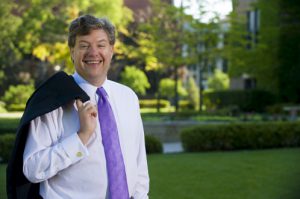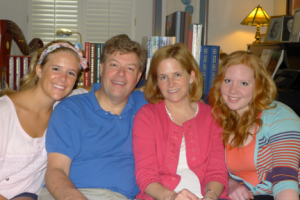August 21, 2012
Currents meets Winona State’s new president, Dr. Scott R. Olson.
“I’m going to enjoy hearing the stories that make up Winona State University. That’s where we find our common humanity, our common purpose … where we come to a common agreement about the things that matter to us.”
Dr. Scott R. Olson, Winona State University’s fifteenth president, says he’ll spend much of his time listening in his first few months in office. With his background at institutions with missions similar to that of Winona State, Olson believes that he can help craft a “common narrative” that will guide the university.
Olson began his leadership of WSU on July 16. He came from sister institution Minnesota State University, Mankato, where he was provost, vice president for Academic and Student Affairs, and professor of Communication Studies since 2003. During the 2010-11 academic year, he served as interim vice chancellor for Academic and Student Affairs for the Minnesota State Colleges and Universities system.
Before moving to MSU Mankato, he was dean of the College of Communication, Information and Media at Ball State, a public university in Muncie, Indiana. While he was at Ball State, Olson helped create the Global Media Network, which won a national award from the American Council on Education, and the Center for Media Design.
Olson began his academic career at Central Connecticut State University where he was professor, associate and assistant to the dean of Arts and Sciences, and director of Graduate Studies in the Department of Communication. He has published two books, 30 book chapters, and 22 academic papers, and served on 21 different international, national, and local boards.
The editors of Currents interviewed Olson on June 22, 2012.
Your biography notes that you grew up in the Twin Cities. What was your early life like?
My grandfathers and dad were dentists but there never was any expectation that I would do that. My dad was also a part-time ski instructor. One of my happiest memories is being with my family skiing at Buck Hill [in Burnsville, Minn.].
Growing up I loved to make movies with friends. This was in the days of Super 8 film, before digital video. One of our friends went on to be a writer in film and television; he’s written for the “X-Files” and other shows. Later, I got a job as an animator’s assistant at a company in Edina. That was pretty great.
Did those experiences lead to your academic interest in communication and media studies?
As an undergraduate I was a history major. A friend of mine was working on a movie for his senior project and asked me if I would do the animation. I started working on it and thought, “This is awesome.”
So I entered graduate school thinking, “Okay, I’m finally going to do this.” I wanted to maybe be a writer for film or television. It didn’t really dawn on me until I was near the end of my master’s, but I discovered the scholarship interested me more than the doing of the thing. The thinking, the research, writing, the teaching, I thought it was fascinating.
I enrolled in the doctoral program and pursued a career as a professor. I found the right path. I love academics and being in the university culture.
Your teaching and research interests involve how media is received by and adapts to global cultures. Does this inform your communication style?
I’m very interested in common wisdom, common understanding. That’s one of about three good ideas I’ve had in my life. [Laughs] Another was to marry my wife, Kelley. The other was to come to Winona State.
I love stories. I love hearing stories. And I kind of like telling them. They’re where we find our common humanity and also where we find our common purpose.
Do you think you know the story of Winona State?
Not fully. What I have is broad sense of the “epic” story: the good that it’s done, the greatness it engenders, faculty members and staff members and students doing incredible, amazing things. Over the next few months, I’m really going to enjoy hearing the stories that make that up.
Part of my job is to help figure out the common threads, and help craft them into a bigger narrative. And see where that might lead us. The story has been amazing so far, but that’s not to sit back and say, “That’s it. We did it.” Winona’s greatest days lie ahead. I wouldn’t be here if I didn’t believe that.
Your career has been at well-regarded regional public universities. Was that a deliberate choice?
My education is from a different kind of place. While I wouldn’t diminish the important role that universities like that play, I chose to work at institutions that, 150 years or so ago, were normal schools.
Today they’ve evolved into the “people’s university.” This is where access, opportunity, and success occur. These are the universities where we care deeply about our students in ways that I didn’t experience as an undergraduate. That mission was appealing to me.
What is their role in higher education?
The beauty of Winona State and institutions like it is that they give students from all kinds of backgrounds, all kinds of experiences, a shot at the American dream.
Students come here – maybe the first from their family to go to college, maybe they didn’t think they could come to a place this great – because the faculty and staff care passionately about them. Lives are changed, transformed, every day.
You see it on orientation day, a kind of wonderment: “I can’t believe we’re going to be part of this.” Then you see it again at commencement. The same wonder is there, but it’s different: “You did it! This place has opened for you pathways to whatever it is you wanted to be.”
Do universities like WSU face challenges?
At the moment, we’re challenged by the squeeze caused by the state not appropriating the resources it once did, and our commitment to keep tuition as low as possible. But the mission has not diminished one bit. It’s needed more now than ever.
You may be the first WSU president to have won an Emmy, for a documentary on digital learning.
I was executive producer – the idea guy, the budget guy – which means that I didn’t get to have any fun!
At Ball State a colleague and I received funding from the Lilly Foundation to look at the issues around converting from analog to digital media. One thing we did was a documentary about how the digital environment can transform learning. We looked at schools, in Mexico, Germany, Japan, that were using technology and at how kids there learned. The film aired on PBS and won five or six Emmys.
Did the color purple influence your decision to pursue the presidency here?
[Now joined in interview by wife Kelley Olson]: What color could be greater than purple?
[Scott Olson]: It’s absolutely our favorite color. It’s in our blood. Of the five places we’ve been, three have been purple. It’s a dignified color. It’s a royal color. It’s an academic color. My doctoral robe is purple. We’re thoroughly committed to purple.
There’s a rumor that you plan to live in an apartment on West Campus at first.
We thought it would be a good way to get a crash course in Winona State culture. To get to know the students, campus, to get to know the community much more quickly than if we had bought a home already. My first priority is to understand what it is about Winona that has made it great for 150 years. This seems like a good way to get at that.
When we told our two daughters, who are both college age, they said, “Dad, you’re out of your mind. Those students don’t want you there.”
What do you enjoy outside of campus?
[Kelley Olson]: Right now I work as development director for the YWCA in Manakato and have always had a mission-driven career in development. I’ve also done some marketing and public relations.
Both Scott and I love music and theater. We’re really looking forward to the Great River Shakespeare Festival performances when we get to Winona.
[Scott Olson]: I’m a voracious user of the media. It fascinates me and it’s my scholarly area, so I read and watch a lot when I’m not working. You probably won’t see me out in the garden that much, but you might see me at the Winona movie theater with Kelley.
We have a family cabin up north and like to spend time there relaxing and reading. And of course, I love skiing.
[Kelley Olson]: I go with him but would much rather look down from the top of the mountain than ski down.
Very much a team, the Olson family – Scott and Kelley along with daughters Katie and Lucie – plans to be “very visible on campus and in the community.” Here’s a brief overview of Winona State’s first family.
Scott, a Minnesota native who earned his bachelor’s and doctoral degrees at Northwestern University, enjoys skiing, scuba diving, sailing, and music.
Kelley grew up in Michigan and earned her bachelor’s at Northwestern. She has worked as a development and marketing professional for St. Joseph College, the Connecticut Easter Seal Society, and the Mankato YWCA. She enjoys tennis, watching sports and movies, and theater.
Katie is a student at Minnesota State University, Mankato, and is a budding writer who has written a novel and scripts for television shows. She enjoys tennis, skiing, and art.
Lucie is beginning her freshman year at the University of San Diego. Her parents say she is inclined toward math and science and is interested in service work. A gymnast, she also plays tennis and skis.



